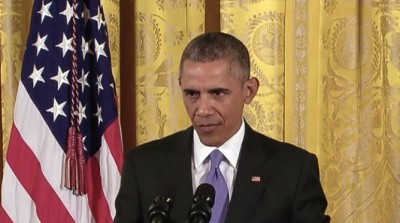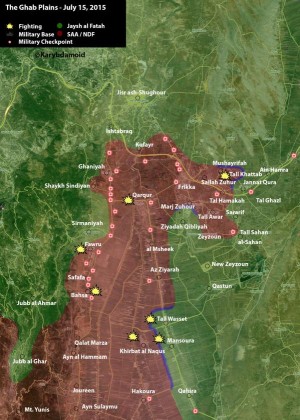PHOTO: President Obama at a Tuesday press conference
LATEST
- Syrian Kurdish Leader Appeals for US Cooperation
- Villages Handed Back and Forth in Fighting in al-Ghab Plain in Hama Province
- Rebel Attacks on Regime Enclaves in Idlib Province, Retaliating for Zabadani Offensive
A day after a nuclear agreement with Iran, President Obama said that “it’s important for [Tehran] to be part of [the] conversation” on the resolution of Syria’s conflict.
See Iran Video & Transcript: President Obama’s Press Conference on Wednesday
The statement, made at a press conference in Washington, appears to be a notable shift in US policy on the Islamic Republic’s involvement. Last year, the US objected to Iran’s presence at a peace conference, as UN Secretary General Ban Ki-moon rescinded an invitation to Tehran. US Secretary of State John Kerry reportedly lobbied for Iran to be excluded.
However, asked if the US would be “working directly with Iran”, Obama replied:
I do agree that we’re not going to solve the problems of Syria unless there’s buy-in from the Russians, the Iranians, the Turks, our Gulf partners.
It’s too chaotic. There are too many factions. There’s too much money and too many arms flooding into the zone.
It’s gotten caught up in both sectarian conflict and geopolitical jockeying, and in order for us to resolve it, there’s going to have to be agreement among the major powers that are interested in Syria that this is not going to be won on the battlefield.
So Iran is one of those players, and I think that it’s important for them to be part of that conversation.
Syrian Kurdish Leader Appeals for US Cooperation
The head of Syria’s Kurdish Democratic Party (PYD), Salih Muslim, has appealed for political support from Washington.
Writing in The Huffington Post, Muslim tried to build on recent military advances with the assurances:
We are admittedly far from perfect, but we are willing to improve. We have repeatedly called on international organizations to visit Rojava [Syrian Kurdistan] to assess our needs in terms of the basic living services and humanitarian aid. We also welcome U.S. diplomats to visit Rojava and make objective assessments. We are determined to transfer our region to a transparent democracy that respects the rule of law and gender equality.
Critics have claimed that Kurdish forces have displaced Arab residents of northern and eastern Syria in their offensives, and Turkish President Recep Tayyip Erdoğan has expressed hostility towards a Syrian Kurdistan.
Muslim denied the charges and a drive for independence, and he responded to Turkey: “The future of Syria must be determined by the Syrian people without any regional influence, realizing that a dictatorial system is no longer feasible for Syria.”
The Kurdish leader concluded:
As we are waging this war against ISIL [the Islamic State], together with the allied countries, the United States must not abandon the people of Rojava for the interests of the regional states who are actually doing very little to fight ISIL. Such policy could potentially reverse all the progress that we have made on ground against ISIL.
While we value the decision of President Obama to support Rojava militarily against ISIL, the administration can do more. The YPG collaboration with the allied countries has proven effective against ISIL, and we ready to hold diplomatic talks with the U.S. government to exchange political views.
Villages Handed Back and Forth in Fighting in al-Ghab Plain in Hama Province
Regime and rebel forces are swapping control of villages in the southern al-Ghab Plain in Hama Province, with neither side gaining a decisive advantage.
Rebels moved into part of the plain this spring, following their offensive through almost all of neighboring Idlib Province.
Assad forces have tried to counter-attack, and this week the Syrian military claimed it had moved into the villages of Khirbat Al-Naqous, al-Mansoura, and Tal Wassit.
However, pro-Assad outlets admit that al-Mansoura is back in rebel hands, and reports indicate that the opposition has also recaptured Tal Wassit.
(Map by Karybdis)
Rebels in Mansoura:
Rebel Attacks on Regime Enclaves in Idlib Province, Retaliating for Zabadani Offensive
Rebels have launched rockets and shells on two regime enclaves north of Idlib city, retaliating for the Hezbollah-regime offensive against Zabadani in Damascus Province.
The rebel coalition Jaish al-Fateh announced the attacks on Fu’ah and Kafraya on Wednesday, and videos soon showed the launch of the rockets.
The fortified enclaves of Fu’ah and Kafraya, north of Idlib city, have escaped capture as rebels have taken 95% of Idlib Province. Rebel sources say almost all civilians have left the areas, except for the families of some of the Syria militia in the villages.
Hezbollah and Assad troops launched an assault on Zabadani, 31 km (about 19 miles) northwest of Damascus, two weeks ago. There are conflicting reports of the progress of the offensive, which is accompanied by daily aerial bombardment.
Rebel sources claim that they captured 50 million SYP (about $160,000) which regime warplanes tried to drop into Fu’ah and Kafarya. One local source explains that the bills were likely for troops if they flee the villages: “Giving each fighter enough money so that he can escape for himself is doable, an organized retreat thru rebel-controlled land is not.”
The pro-Assad al-Masdar News says that 22 rockets have also been fired into the regime enclaves of Nubl and al-Zahraa, north of Aleppo city.


